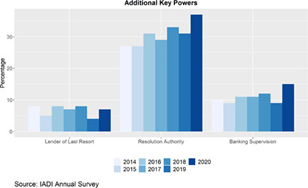With the feature of “Fast - Cheap - Wide - Easy - Personalized", financial consumers, including depositors, benefit from digital financial services. According to Consumers International's 2017 Future of Banking report, financial consumers is benefiting from financial digitization. DFS provides financial consumers in general and depositors in particular with products and services that are more convenient, faster, cheaper and suitable for individual needs; allowing service users to easily access, compare online and determine the best offers and best fit their needs. The digital environment enables depositors to overcome the limitations of space and time to expand their opportunities to access and use deposit products and services even without a physical branch or agent; help improve depositors' understanding of financial products and financial decisions, provide appropriate security and precautions to help depositors avoid fraudulent transactions and risks, opening up financial inclusion opportunities for previously financially excluded and low-income populations.
International experience on depositor protection policy and mechanisms in the digital age
To better recognize and leverage the benefits, while minimizing risks and negative impacts of DFS, policies and approaches need to be designed to provide policy tools and operational guidance that balance the benefits and opportunities of DFS products with potential risks to financial consumers in general and depositors in particular.
The practice of many countries shows that an effective protection mechanism along with access to suitable financial products and good quality financial education are basic requirements for consumer confidence and trust in the market. The framework to protect financial consumers in the digital age still needs to first comply with the G20 High Level Principles for the protection of financial consumers.
In general, through the study of international experience in protecting financial consumers effectively, the agencies that monitor and protect financial consumers need to:
First, ensure adequate knowledge of the financial services market by: (i) Conducting market assessments or research to understand and keep up to date with developments in DFS, such as products or new services, distribution channels and new suppliers; (ii) Actively and regularly engaging in interactions with actors that provide and distribute innovative products, services or channels; (iii) Engaging in collaboration with industry bodies and other stakeholders to obtain information regarding technology trends and developments as well as emerging issues in the market such as preparedness ready to deal with network problems; (iv) Engaging proactively and regularly with consumers, including conducting consumer research and collaborating with consumer representatives to ensure a full understanding of issues and experiences from a consumers about digital financial services; (v) Cooperating with other relevant supervisory authorities to facilitate information sharing or coordinate monitoring activities in areas of mutual interest.
Second, ensure timely adjustment of management and monitoring tools and methods in the digital environment, such as setting up or upgrading systems and processes for collecting, storing and analyzing relevant data to inform management decisions, to monitor as well as to understand the behavior of market participants, including consumers. Ensure access to the data needed to enable effective external monitoring. Use and apply technology to help them monitor financial service providers and identify and monitor risks arising in the financial system.
Third, have the right resources and capabilities to operate effectively and flexibly in a digital environment, for example: ensuring that the workforce has the right mix of skills and competencies to receive identify potential risks from the design and delivery of DFS products; ensure staff training and development keep up with the latest technology developments and applications.
Fourth, be able to effectively deal with new technology issues, while ensuring well-maintained consumer protection measures. Licensing or authorization requirements can be fulfilled by establishing mechanisms or adopting commensurate approaches that enable businesses to innovate, while maintaining safeguards and related testing regulations. Once regulations and testing methods are established, they must be governed by clear rules or principles to ensure fairness, transparency, consumer protection, and wide accessibility.
Fifth, set up internal working groups to address innovation issues (response to requests for information from businesses, assess compliance with the current legal and regulatory framework for businesses, new products and services, etc.) with the involvement of relevant entities/departments and, where relevant, supervisory authorities responsible for data protection and competition.
Sixth, advice or guidance to new market entrants on how to apply regulation to new business models that can benefit consumers, leading to a common guide for all market participants.
Seventh, review existing regulations, and if necessary amend, supplement or clarify regulations to accommodate new DFS products.
Eighth, supervisors from different jurisdictions need to work together to ensure that consumers are protected in cross-border transactions, through a number of activities such as: Information sharing between relevant supervisory authorities to effectively monitor the marketing and sale of cross-border financial products and services. If necessary, ensure that consumer complaints related to cross-border transactions are referred to the correct relevant authorities. Increase coordination to promote consistency, avoid opportunities for arbitrage regulations, and support law enforcement activities.
Some recommendations for Vietnam
To strengthen the protection of financial consumers in general and depositors in particular in the digital era, from international experience and the current situation, it is necessary to:
Firstly, build and perfect the legal framework. It is necessary to improve the legal system for the protection of financial consumers. In particular, attention should be paid to issues related to the DFS that clearly stipulates the standards of financial products and services, and the obligations of entities providing financial products and services to the market such as disclosure and transparency issues and business practices; handling and maintaining customer accounts; confidential information and personal data of customers; dispute settlement processes and mechanisms… in line with international standards and practices. The regulatory gaps of fintech activities such as peer-to-peer lending, crowdfunding, digital currency, cashless payments, information sharing and security need to be quickly addressed.
Second, strengthen the role and improve the operational efficiency of the institutions implementing the protection of financial consumers in general and depositors in particular. These agencies have clear functions, mandates, and sufficient resources and authority to effectively protect consumers of financial services in the digital era. This requires these agencies to meet requirements such as ensuring adequate knowledge of the financial services market, appropriate resources and capabilities, management and monitoring tools and methods. tailored, while finding new ways to operate efficiently and flexibly in a digital environment, balancing the goal of encouraging and supporting fintech innovation with the goal of protect financial consumers.
Strengthen the coordination mechanism and authority, besides assigning specific responsibilities to specialized financial regulatory and supervisory agencies, so that these agencies can perform the task of protecting financial consumers more effectively; Strengthen the capacity of financial services consumer protection agencies and social organizations to protect financial consumers, especially in terms of human resources, technology, knowledge about DFS, digital monitoring technology; Develop a closer and more effective coordination mechanism between agencies in the financial safety net.
The deposit insurer, the agency that directly protects the interests of depositors, should be provided with powers and enhanced operational capacity commensurate with its roles and responsibilities. The Law on deposit insurance needs to clarify the rights and obligations of the deposit insurer, supplement regulations in the direction of DIV to participate more deeply in the process of restructuring credit institutions, resolving weak credit institutions such as: Resolving and intervening early, especially for people's credit funds which are specially controlled through forms such as: direct takeover, participation in governance or capital contribution to govern the operation of people's credit funds... At the same time, the Law on Deposit Insurance also needs to clearly stipulate the supervisory role of DIV so that it can assess risks and give early warning to problematic credit institutions by empowering the DIV to have in-depth and complete access to information on assessing the soundness of credit institutions.
Supplement the functions and tasks of DIV such as: Regulations that DIV shall coordinate with the SBV in examining and supervising the People's Credit Funds in complying with the provisions of the monetary and banking laws at the request of the SBV. Regarding special lending to specially controlled credit institutions, supplement the regulation that DIV makes special loans to specially controlled credit institutions to be consistent with the provisions of the amended Law on Credit Institutions (2017) and concretize a number of contents to ensure the legal basis DIV during the special lending process, for example: Special loan to support liquidity for credit institutions, risk handling mechanism.
Third, improve the mechanism to settle disputes, complaints and denunciations. In the digital age, complaints and disputes become more complicated and difficult to handle due to diverse market participants, difficult to manage, multi-party transactions, and unlimited time and space. Therefore, the traditional rules and institutions for resolving disputes, complaints and denunciations need to be adjusted in addition to introducing new methods of handling. The regulatory framework for the procedure for complaints of consumers of financial products should simplify and strengthen the role and responsibility of financial product and service providers in the direction and sequence of: (i) Financial institutions have mechanisms on processes and procedures for receiving and settling customer complaints; (ii) If the dispute or complaint is not resolved, it can be transferred to the court for settlement; (iii) Promote the role and effectiveness of alternative dispute resolution systems such as financial ombudsmen or mediation services to assist parties in resolving out-of-court disputes. It is necessary to strengthen the rigor of the sanctions to deal with violations of regulations causing damage to consumers and regulations on compensation for damage caused by the aforementioned violations of the supply organizations. provide financial services.
Fourth, improve consumer understanding of financial services. Develop an overall, long-term strategy and program for financial literacy and education. Diversify forms and channels of education, dissemination, especially digital forms and means to improve financial literacy for financial consumers, thereby helping them confidently integrate financially make the right financial decisions, in accordance with needs and capabilities and maximize benefits. Strengthen education and communication on violations, remedial mechanisms to educate and deter illegal behavior and business ethics of service providers, and help financial consumers on its own or effectively use mechanisms to protect their legitimate rights and interests.
Enhance the role of financial regulators and supervisors in education and improve financial literacy for financial consumers through the following activities: (i) Designing training materials; (ii) Providing face-to-face training courses; (iii) Conducting financial literacy surveys and publishing periodic reports; (iv) Periodic releasing of information on financial market overview and financial products.
The deposit insurer needs to play a larger role and participate more actively in financial education and literacy for financial consumers, especially depositors. The DIV should actively promote the dissemination of the deposit insurance policy to the public. This activity should focus on disadvantaged people, with little or no financial understanding, including young people who are university and college students - the group that will become financial consumers in the future, depositors in rural, remote and isolated areas, depositors have little access to information on finance - banking and deposit insurance, which helps them to wisely choose financial products for investment, avoiding risks fraud.
In summary, the digital financial era brings both benefits and risks for financial consumers in general and depositors in particular, placing on the shoulders of authorities protecting financial consumers enormous challenges in keeping up with the development of technology, the diversity and fast change of entities and products and services in the financial market, and the flexible balance of goals to enhance and encourage financial innovation and protect financial consumers. With the low level of development, but the large openness of the financial and banking market in Vietnam, this challenge becomes even bigger and heavier on the shoulders of the competent authorities. Caring for, protecting the interests of financial consumers, educating and improving financial understanding of financial consumers are one of the pillars of a financial inclusion strategy, helping Vietnam's financial market to develop safely and sustainably.



























